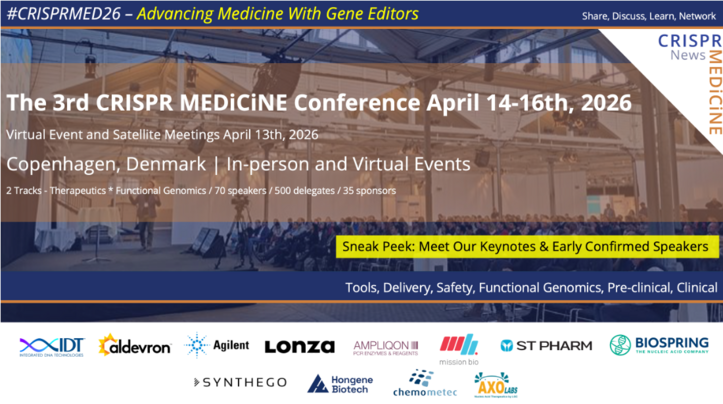Clinical Update: First Trial of Base-Editing Therapy Lowers Cholesterol in Humans
Earlier this week at the American Heart Association’s Scientific Sessions 2023 in Philadelphia, Verve Therapeutics announced the first human proof-of-concept data for in vivo base editing from the ongoing Phase 1b heart-1 clinical trial of VERVE-101.
Verve is developing VERVE-101 as a single-dose base-editing treatment for heterozygous familial hypercholesterolemia (HeFH).
The new data revealed dose-dependent reductions of disease-causing low-density lipoprotein cholesterol (LDL-C) in two patients treated with a single, potentially therapeutic dose of VERVE-101.
Familial hypercholesterolemia (FH)
Familial hypercholesterolemia (FH) is a genetic disorder characterised by life-long elevated levels of low-density lipoprotein cholesterol (LDL-C) in the blood, which results in a greater risk of developing atherosclerotic cardiovascular disease. The disorder affects more than 3 million people in the United States and Europe, and is caused by an inherited genetic mutation that leads to an inability to remove the extra cholesterol that accumulates in the blood. Mutations in LDLR, LDLRAP1, APOB, and PCSK9 genes have been determined to be causitive, with LDLR mutations being the most common.
Heterozygous FH is the most common form of FH; this is caused by a single DNA variant inherited from one parent.
LDLR is responsible for the production of the low-density lipoprotein receptor which binds to LDLs and removes them from the body, subsequently removing excess cholesterol. LDLR therefore plays a critical role in cholesterol regulation and mutations in the gene lead to elevated levels of LDL.
The current treatment approach is focused on reducing LDL levels in the body, and involves a combination of diet, excercise and statin-based drugs. These treatments are life-long and most individuals living with FH are not at their LDL-C goal.
VERVE-101: a one-and-done base-editing treatment to cut cholesterol
VERVE-101 represents a novel approach to treating FH, and is the only in vivo base-editing candidate in the clinic. It is specifically designed to permanently switch off the PCSK9 gene in the liver, to durably lower disease-driving low-density LDL-C.
How does VERVE-101 work?
VERVE-101 consists of an adenine base editor (ABE) messenger RNA and an optimised guide RNA (gRNA) targeting the PCSK9 gene, both of which are packaged in an engineered lipid nanoparticle. This cargo is administrered in vivo via blood infusion and it gets taken up by the liver.
Once inside the liver, the gRNA and ABE-encoding mRNA are released, leading to translation of the base editor and its migration, along with the gRNA, to the nucleus, followed by disruption of the PCSK9 gene.
By making a single A-to-G change in the DNA genetic sequence of PCSK9, VERVE-101 inactivates the target gene. This has been shown to up-regulate LDL receptor expression, which leads to lower LDL-C levels, thereby reducing the risk for atherosclerotic cardiovascular disease (ASCVD).
Efficacy and safety data from heart-1 trial
Efficacy
The heart-1 trial data reported this week encompasses patients with a high burden of coronary heart disease, living with HeFH, established ASCVD and uncontrolled high cholesterol levels.
According to the data, dose-dependent reductions in blood PCSK9 protein levels were observed following treatment with VERVE-101, which supports editing at the intended genomic site. Dose-dependent LDL-C reductions, which are a validated measure of clinical efficacy for this patient group, were observed one month after treatment with VERVE-101.
Six patients were treated at sub-therapeutic doses and three patients were treated at potentially therapeutic doses of 0.45 mg/kg and 0.6 mg/kg. The two patients treated with 0.45 mg/kg of VERVE-101 exhibited time-averaged blood PCSK9 protein reductions of 59% and 84% and time-averaged LDL-C reductions of 39% and 48%. The patient treated with the higher dose of 0.6 mg/kg revealed a time-averaged blood PCSK9 protein reduction of 47%, and a time-averaged LDL-C reduction of 55% that persisted for at least 180 days, with follow-up ongoing.
Safety
Safety analyses revealed VERVE-101 to be well-tolerated in the two lower dose cohorts, with no treatment-related adverse events observed. Treatment-related adverse events were observed in the two higher dose cohorts, and these included transient, mild or moderate infusion reactions and transient, asymptomatic increases in liver transaminases with mean bilirubin levels below the upper limit of normal. All infusion reactions and liver transaminase elevations resolved without clinical consequences.
As detailed in a press release published by Verve Therapeutics: two patients experienced serious adverse events, which were each cardiovascular events in the context of severe underlying ASCVD. One patient dosed in the 0.3 mg/kg cohort had a fatal cardiac arrest approximately five weeks after treatment due to underlying ischemic heart disease, which was determined by the investigator and independent data and safety monitoring board (DSMB) to be not related to treatment.
One patient dosed in the 0.45 mg/kg cohort experienced a Grade 3 myocardial infarction the day after treatment. This event was considered potentially related to treatment due to the proximity to dosing. The event occurred in the setting of unstable chest pain symptoms prior to dosing that were unreported to investigators. Coronary angiography taken after the event showed critical left main equivalent coronary artery disease. The same patient also experienced non-sustained ventricular tachycardia (Grade 2) more than four weeks after dosing, which was determined to be unrelated to treatment.
The heart-1 clinical trial - next steps
In its press releaase, Verve announced that the safety data from the heart-1 trial support further development of VERVE-101, and that the adverse events observed were consistent with the severity of heart disease within the patient population participating in the trial.
The Phase 1 heart-1 clinical trial is currently enroling patients in the 0.45 mg/kg and 0.6 mg/kg cohorts in the UK and New Zealand, Following the lifting of a clinical hold in October 2023, which the FDA had previously placed on VERVE-101 because of concerns about the potential hereditability of VERVE-101-induced base edits, Verve Therapeutics is expected to initiate a clinical trial of VERVE-101 at clinical sites in the United States.
In 2024, Verve plans to select a single dose from the dose-escalation phase of the heart-1 trial, and initate and complete this expansion cohort of the trial. The company also plans to initiate a Phase 1 trial for another in vivo, PCSK9-targeting candidate, VERVE-102, in 2024 following regulatory approval. VERVE-102 is designed to target PCSK9 in the same way as VERVE-101, but the newer candidate is developed using Verve's proprietary GalNAc-LNP devliery technology, which has been demonstrated to allow for low-density lipoprotein receptor independent delivery (1).
We will continue to provide updates on the heart-1 clinical trial as new data emerges.
For a complete overview of current gene editing clinical trials, check out CRISPR Medicine News' Clinical Trials Database.
References
1. Kasiewicz, L.N., Biswas, S., Beach, A. et al.GalNAc-Lipid nanoparticles enable non-LDLR dependent hepatic delivery of a CRISPR base editing therapy. Nat Commun14, 2776 (2023). https://doi.org/10.1038/s41467-023-37465-1.
Related CMN articles
CRISPR Medicine News spoke with Verve Therapeutics’ CEO, Sekar Kathiresan, shortly after dosing of the first individual with VERVE-101 last year. He discussed VERVE-101's mechanism of action and how it may transform the lives of individuals with cardiovascular disease. You can read that interview here.
To get more of the CRISPR Medicine News delivered to your inbox, sign up to the free weekly CMN Newsletter here.
Tags
ArticleNewsClinical News UpdatesIn vivoLipid-based nanoparticleFamilial Hypercholesterolemia, FHBase editorsVerve Therapeutics, Inc.
CLINICAL TRIALS
Sponsors:
Suzhou Maximum Bio-tech Co., Ltd.
Sponsors:
Zhejiang University







